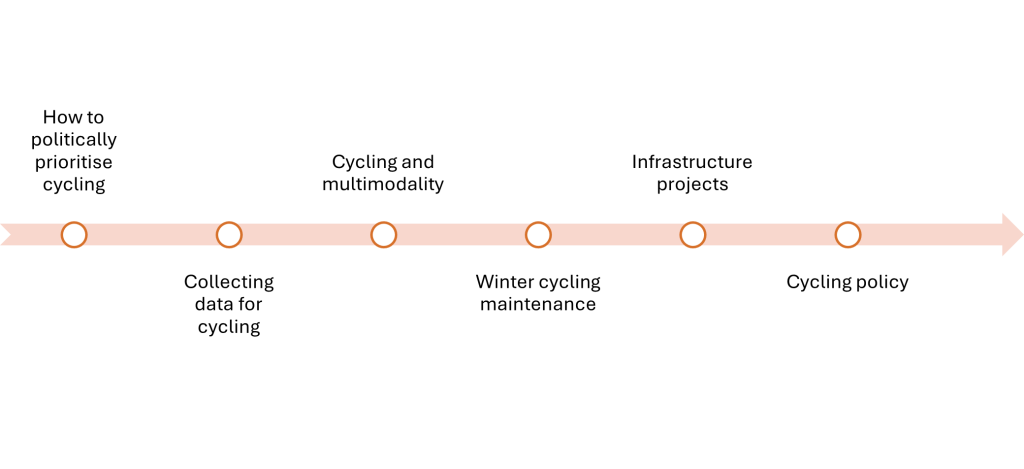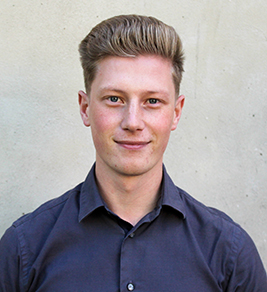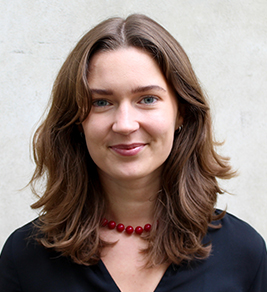The bicycle has the potential to play a key role in developing sustainable cities and regions. Despite overwhelming evidence of the benefits of cycling, many cities and regions still lack adequate political will, financial support, knowledge, data, and/or long-term planning tools and mechanisms to harness the numerous benefits of the bicycle. Cycling is not always understood or planned for as a legitimate mode of transport. Challenges remain when it comes to achieving integrated regional cycling efforts among and across municipalities.
Since 2023, Nordregio has worked with the European Cyclists’ Federation to coordinate the Nordic Cycle Network: a knowledge-network designed to kick-start a dynamic exchange of ideas among municipal and regional planners committed to improving cycling conditions.
Network members include:
(* indicates involvement since 2023)
Denmark
Copenhagen*
Aarhus
Roskilde
Cycle Superhighways of the Capital Region*
Cycle Superhighways of the Central Region*
Finland
Helsinki*
Helsinki Regional Transport Authority (HSL)*
Tampere
Iceland
Reykjavík*
Transport for the Capital Area (Betri samgöngur)
Icelandic Road and Coast Management Agency (Vegagerðin)*
Norway
Oslo*
Bergen
Sweden
Stockholm*
Region Stockholm*
Region Skåne*
Göteborg
Malmö
Helsingborg
Örebro
In its first two years, the project held six knowledge-sharing workshops with primarily capital cities and regions in the Nordic countries, leading to improved technical, planning, and organisational know-how for planners. The network also met in-person for a study visit in Stockholm. Between 2023 and 2024, the project produced a working paper on national-level cycling policy, and the knowledge-exchange workshops culminated in a final policy brief: Debunking cycling myths: Realities and recommendations for Nordic planning and policy.
The network will continue through 2026 with a new workshop series and participation from additional cities and regions of the Nordics. The project has two interrelated objectives and uses integrative research methods to achieve them:
Objective 1: To facilitate critical reflection, discussion, and detailed knowledge exchange among Nordic municipal and regional actors to tackle real-world problems and to apply new knowledge in their practical work.
Objective 2: To encourage greater local and regional collaboration on cycling—leading to better spatial planning of Nordic cities and regions—by synthesising workshop findings and analysing cycling strategies in Nordic cities and regions. Drawing on desk research that considers the latest literature on effective cycling policy at the local and regional levels, researchers will consider cycling strategies in several case study cities and regions and combine this analysis with the insights learned from within the workshops and study visit. This analysis work will lead to the publication of a report geared towards other planners and policymakers. The report will highlight how several Nordic cities are tackling key transport themes with regards to cycling.
Workshops
Starting in Autumn 2025, the Nordic Cycle Network will host a 4-part workshop series on several critical topics practitioners are working with to improve cycling in Nordic cities and regions.
In the previous project period, network members participated in six knowledge-sharing workshops and one study visit between August 2023 and September 2024. The thematic focus and structure of the workshops were designed based on the needs and interests of the cycling network participants.

Network
Participating cities and regions contribute to knowledge-sharing discussions, connect with other municipalities and regions, ask questions, and share their experiences and expertise with one another.
By joining the Nordic Cycle Network, we expect these cities and regions to gain new insights and tools that can encourage and improve their own cycling strategies, initiatives, and infrastructure projects. By building connections with other cities and regions, we expect that participants will form deeper connections across countries that lead to improving cycling in the Nordic Region as a whole, learning from one another’s successes and failures, encouraging one another, and opening doors for future collaboration.
Findings
2025
Debunking cycling myths: Realities and recommendations for Nordic planning and policy
This policy brief is a culmination of the challenges, lessons learned, and good practices of cycling in the capital cities and regions of the Nordic countries. It is derived from the research and discussions among network participants and highlights eight common myths about the role of the bicycle as a mode of transport in the Nordic Region.
Each myth is followed by an evidence-based rebuttal, confronting the inaccurate claims and uprooting the underlying problem. After each reality statement, it provides suggestions and good practices based on both desk research and contributions from practitioners in the Nordic Cycle Network.
2024
Nordic Cycle Network at Nordregio Forum
Hear Lisa present some of the preliminary findings of the policy brief on Debunking cycling myths here
Nordic Cycle Network at the Nordic Green Transport Forum
Becoming the most integrated and sustainable region by 2030 demands that the Nordic countries reframe mobility narratives from focusing on speed, efficiency, and utility to reimagining the purpose of the city. Nordregio researcher Lisa Rohrer made this argument at the Nordic Green Transport Forum in May 2024, presenting insights from the Nordic Cycle Network.
Drawing on discussions from the Nordic Cycle Network’s workshop series for municipal and regional cycling planners, Lisa emphasised that the bicycle is a smart mobility option because it effectively responds to the needs and interests of individuals as well as of our collective society. She provided several recommendations and methods for addressing major challenges planners face when implementing cycling in their cities, including ways to anchor funding, examples of success for collecting high-quality cycling data, and numerous approaches for providing residents with easy on-ramps to begin cycling.
Two main takeaways stand out from the presentation: Firstly, Lisa challenged the conference audience to think of green transportation beyond electrification:
“At the end of the day, making our cities more sustainable is going to require rethinking public space. We have to transform our built environments as a whole.”
Secondly, Lisa challenged how we perceive the purpose of our cities:
“When we consider the language we use around transport, we often hear language about efficiency, speed, and utility. And the bicycle can often deliver on these. But our cities are more than just mobility solutions. Cities are also places of sensory experiences, social and cultural diversity, and democratic exercise and participation. And the way we move around the city can help or hinder these experiences.”
Hear Lisa talk about the network in a video produced by Filmkonsulentene for Nordic Energy Research, organisers of the Nordic Green Transport Forum.
2023
This working paper reviews how Nordic countries are working to improve cycling via policy and planning. It takes a national-level approach to review cycling objectives in Denmark, Finland, Norway, and Sweden, reviews a range of mechanisms to achieve these objectives, and identifies the key actors responsible for carrying out the work.




